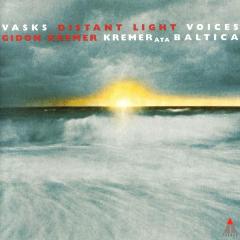Peteris Vasks - Distant Light - Voices (1999)
Peteris Vasks - Distant Light - Voices (1999)

1. Distant Light (Tala Gaisma): Concerto For Violin And String Orchestra 2. Voices (Balsis): Voices Of Silence (Klusuma Balsis) 3. Voices (Balsis): Voices Of Life (Dzivibas Balsis) 4. Voices (Balsis): Voice Of Conscience (Sirdsapzinas Balss) Gidon Kremer – violin & conductor Kremerata Baltica
The grand scale of Arvo Pärt and Giya Kancheli, some very striking climaxes, and the nostalgic strains of Latvian folk music seem to collide in the compositions of Peteris Vasks. Romantic, melancholic, and utterly enjoyable, Vasks sounds at times like Pärt for people with short attention spans--as glacial as his music can get, an explosive violin solo or familiar waltz is just around the corner. There's an unmistakable sadness that never escapes his work, obviously reflective of the tumultuous nature of his Latvian homeland. But this emotion-filled music seems tailor-made for violinist Gidon Kremer, who--accompanied here by his hand-picked Kremerata Baltica ensemble of young Baltic-area musicians--clearly embraces the works. Distant Light is a 30-minute single-movement concerto, where graceful string passages give way to soaring violin solos. Voices is a symphony for strings with quiet expanses, birdsong, and a tumultuous third movement. Simply put, these are gorgeous works. Vasks is clearly a composer to watch and Kremer, as usual, is brilliant. --Jason Verlinde, amazon. Com
This luscious recording is for everyone. Peteris Vasks is a Latvian composer who might be referred to as "nationalistic"; at least he tends to tie much of his music in with his homeland. He seems to have the soul of a poet and his music and its involvement with his life (and the life of his countrymen) never appears forced or false. The title piece here is a concerto for violin and string orchestra--a single movement, half-hour work that goes through nature calls, periods of great introspection, and emotional outbursts all while offering melodic, contrapuntal, and rhythmic motifs to keep our interest. Voices is in three movements and is not far removed from the concerto's sound world; sadness and hope seem to be inter-related and nature tends to be friendly (there are enough birdsongs here to satisfy Messiaen). The piece was composed in l99l as the Soviet Empire was disbanding--but not without great grief and much bloodshed. These facts shed light on the music but cannot explain its beauty. The playing by Gidon Kremer and his group is ravishing, and Teldec's engineers should be lauded equally highly. A real stunner. ---Robert Levine, ClassicsToday.com
download (mp3 @320 kbs):
uploaded yandex 4shared mega solidfiles zalivalka cloudmailru filecloudio oboom clicknupload








